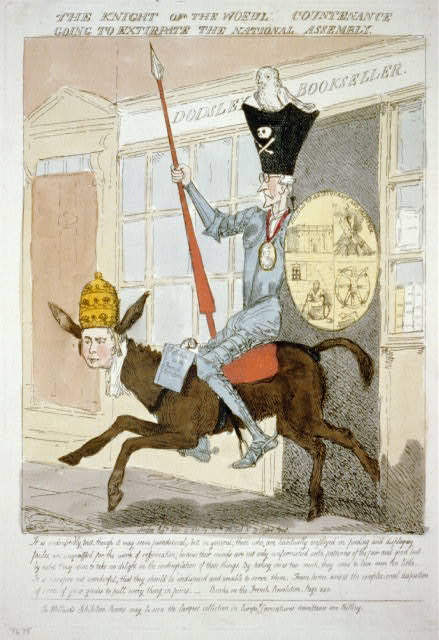Among the many memorable turns of phrase in Edmund Burke’s Reflections on the Revolution France (1790), few have proved more striking than its florid descriptions of Marie Antoinette and her treatment at the hands of the October 6th mob at Versailles. Burke laments the occasion of her forced journey to Paris at the hands of her own subjects with these well-known lines:
The Reading Room
Burke and the Age of Chivalry
I thought ten thousand swords must have leaped from their scabbards to avenge even a look that threatened her with insult. But the age of chivalry is gone. That of sophisters, oeconomists, and calculators, has succeeded; and the glory of Europe is extinguished forever.
This imagery did not go unnoticed by Burke’s contemporaries. Most famously, in 1791’s The Rights of Man, Thomas Paine turns Burke’s allusions against him, warning his readers that, “in the rhapsody of his imagination, he has discovered a world of wind-mills, and his sorrows are, that there are no Quixotes to attack them.” Along the same lines—but with less dexterity—an anonymous 1791 critic mocked the “self-leaping swords” of Burke’s “prose run mad”:
“But the age of chivalry is gone.”—Ay, thank Heaven and Cervantes! …it were better that all its abettors were gone with it, than to have it revived: there are but two [sic] many madmen already in the world without seeking for an addition in knight-errantry.
For critics like these, the parallels between Burke and Cervantes’s confounded hero were simply too delicious to pass up. A 1790 print (see below) depicted Burke, the great man grown tragically (if comically) mad late in his life, riding out from a booksellers on his way to “extirpate the National Assembly”; he rides a papish ass and wields the “Shield of Aristocracy and Despotism.” 

By this time, however, this association could have been made even without reference to the “age of chivalry” passage. If the Burke of the Reflections was, in fact, “mad”—and his friend Samuel Johnson had already begun to suspect it to be the case—it was in no small part due to the grinding experience of his role in the trial of Warren Hastings of the East India Company, whose colonial excesses occupied Burke for the last decade of his long political career. Hastings was ultimately acquitted and Burke’s efforts were in vain, but the image of the lonely statesman, passionately and tirelessly defending the innocent and defenseless subjects of colonial rule against their rapacious masters, recalled for many the confused adventures of the champion of La Mancha.
Today, the passage’s enduring appeal is surely due to what might be called its ideological legibility. Burke is, as we well know, a conservative, and conservatives wish that things would go back to the way they were (when “men were men”). In this passage, these intuitions find a memorable confirmation: Burke longs for the days of knights and maidens, of “generous loyalty to rank and sex,” of “that chastity of honour, which [feels] a stain like a wound,” and he calumnies those who would pull down these lovely hierarchies and inequalities in the name of progress and the rights of man. This makes sense to conservatives and their opponents alike: the ur-conservative refuses to give up on the glorious illusions of the past.
We note with some surprise, then, that Don Quixote himself makes an appearance in the Reflections. In its opening pages, Burke defends his love of a “manly, moral, regulated liberty” against the abstract claims of the revolutionaries and their supporters in England. The kind of “freedom” called out for by the revolutionaries—the kind of “freedom” invoked in the August 1789 Declaration of the Rights of Man and of the Citizen; the kind of “freedom” according to which, in Rousseau’s words, “men are born free”—this sort of freedom is a “metaphysical abstraction.” These abstractions can only mislead, Burke argues, because they stand in “nakedness and solitude,” “stripped of every relation,” stripped especially of their contextual circumstances, according to which “every civil and political scheme [is rendered] beneficial or noxious to mankind.” If freedom is everywhere and always good, then we shall be forced to “congratulate...[a] murderer, who has broke prison, upon the recovery of his natural rights.” To mistake freedom in the abstract for the freedoms provided by a settled and beneficent civil order would be, Burke writes, “to act over again the scene of the criminals condemned to the gallies, and their heroic deliverer, the metaphysic Knight of the Sorrowful Countenance.”
Which party, then, is that of quixotic foolishness? Is it Burke—the lonely champion of a lost golden age, the romantic reactionary tragically fated always to bungle his way through one confused cause after another? Or is it his opponents—Rousseau and Richard Price, men whose minds are so clouded by fantastic utopian visions that they cannot grasp the political reality that confronts them? Likewise with conservatism: is it an ideology for reactionaries and nostalgics? Or is for students of “circumstances,” ever wary of the deceptive allure of romance and ideology?